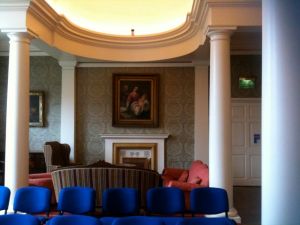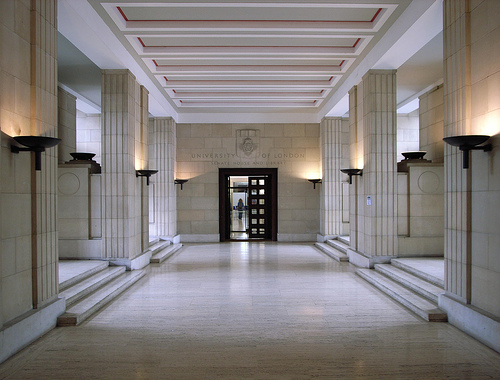“Thriving in difficult times” was the title of the 13th annual Teaching and Learning in History conference – poignant, as this will be the last arranged and funded by the History Subject Centre (one of the more proactive centres, run effectively for many years at Warwick by Sarah Richardson and team) after the news that the HEA will close the regional centres and provide subject support from a reduced central team in York.
The conference focuses on teaching and learning issues within History teaching, and (based on my previous visit in 2009) is a fabulous, discursive conference with student needs and a passion for teaching History at its heart. This one proved to be no different, with the added feel of impending loss and yet a collective belief that these issues, and the community surrounding them, should continue and grow.
 Held in the beautifully situated Lady Margaret Hall at the University of Oxford, the conference opened with a discussion and workshop in which we proactively discussed the key activities of the subject centre, and how these might continue within – and in addition to – the new, cut-down, structure. The four key features were support for new teachers (the Centre’s most impressive work to date, with plans to link together a number of disparate schemes into a UK-wide network of training and support for new lecturers and postgraduates), community (a proposal to take this online and augment a continuing annual conference), publication (the proposal for a new journal to fill the current gap in T&L for History) and regional support (opinion was split on whether the new stringent times will allow for regional support to continue, or whether the three areas above should provide national support with local search/theme options).
Held in the beautifully situated Lady Margaret Hall at the University of Oxford, the conference opened with a discussion and workshop in which we proactively discussed the key activities of the subject centre, and how these might continue within – and in addition to – the new, cut-down, structure. The four key features were support for new teachers (the Centre’s most impressive work to date, with plans to link together a number of disparate schemes into a UK-wide network of training and support for new lecturers and postgraduates), community (a proposal to take this online and augment a continuing annual conference), publication (the proposal for a new journal to fill the current gap in T&L for History) and regional support (opinion was split on whether the new stringent times will allow for regional support to continue, or whether the three areas above should provide national support with local search/theme options).
The rest of the two-day conference covered some fascinating themes, all surrounded by lengthy post-presentation discussion. Highlights included:
- The use of the Big Society as a theme to frame historical discussions around, by George Campbell Gosling (Oxford Brookes) – this was paired with my session on the Great History Conundrum and contextual training, and led to an interesting discussion around the use of modern/familiar contexts as a basis to work in related historical aspects and skills, with equal thinking around ways to counter the negative reception political hot potatoes (in George’s case) and games (in mine) get within higher education.
- A heated discussion around the use of final essays for testing learning outcomes, and rubrics around these. This merged into discussion around effective feedback (the It’s Good to Talk project based at DeMontfort University and presented by Sam McGinty –and one which an upcoming project on audio feedback at the University of Leicester will link in to) and work-based learning(Harvey Woolf and Richard Hawkins from Wolverhampton) – all of which opened up debate around the alignment of assessment and feedback to real activity, and useful outcomes for the student. A case study in personalised, peer-assisted feedback was given by Chris Szejnmann (Loughborough) who described his use of simple Flip cameras to provide reflection and feedback on student presentations.
- A fascinating study around international and regional effects on student work and transition in first year undergraduate courses (Melodee Beals, from the report International Students in History)
Augmented by lengthy coffee-breaks and a chance to reflect on each topic with colleagues, all of the participants took something away which would impact on their own practice in one way or another. For me, five days on, my head is still buzzing with some of the ideas around assessment and feedback – but also, reflecting on the way that communities of practice can form and flourish around issues invoking such a keen interest as student learning in a subject close to one’s heart. I doubt very much if this will be the last time these participants will be gathered together and discussing the latest issues affecting students of History in higher education. Thank goodness.




